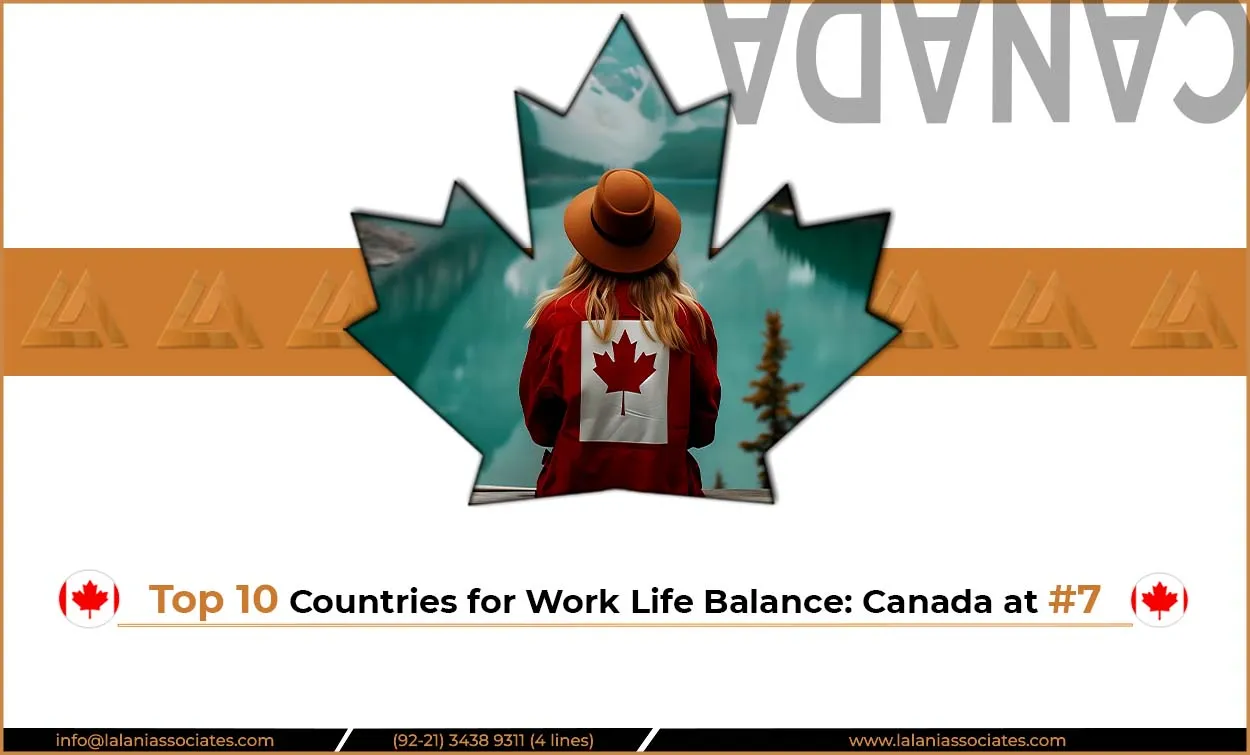
Are you tired of feeling overworked and burned out? You are not the only one. People are looking for locations where they may work to live instead of living to work more and more these days. That's where Canada really stands out. The Global Life-Work Balance Index 2025 says that Canada is the 7th best country out of 60 for finding that perfect balance between work and personal life.
🏆 Canada’s Impressive Global Ranking
Canada is happy to be among countries like New Zealand, Germany, and Norway, with a score of 73.46 out of 100. Even better? It is the only country in North and South America to be in the top 10. That alone shows how much Canada cares about living a balanced life.
📊 What Is the Global Life-Work Balance Index?
Remote, a top HR solutions business, puts together this study every year. In their 2025 edition, they looked at 60 countries and ranked them based on 10 essential factors that show how simple it is for people to manage work and life in each place.
Let's take a deeper look at these indicators and see how Canada did.
🌍 Top 10 Countries for Work-Life Balance in 2025
1. New Zealand - 86.87
2. Ireland - 81.17
3. Belgium - 75.91
4. Germany - 74.65
5. Norway - 74.20
6. Denmark - 73.76
7. Canada - 73.46
8. Australia - 72.10
9. Spain - 71.94
10. Finland - 70.86
🔍 Canada vs. Other Leading Countries
Let’s compare Canada with a few of its top competitors:
| Indicator | Canada | Germany | Norway | Australia | Spain |
|---|---|---|---|---|---|
| Happiness Index | 6.8 | 6.75 | 7.26 | 6.97 | 6.47 |
| Safety (lower is better) | 1.45 | 1.54 | 1.64 | 1.54 | 1.6 |
| Statutory Annual Leave | 17 days | 30 days | 35 days | 30 days | 36 days |
| Paid Maternity Leave | 18 weeks (55%) | 14 weeks (100%) | 49 weeks (100%) | 12 weeks (minimum wage) | 16 weeks (100%) |
| Avg Hours Worked per Week | 35.2 | 33.2 | 32.6 | 32.29 | 36.3 |
While Canada offers slightly fewer vacation days than European countries, it still scores high in safety, healthcare, and overall work culture.
🔑 Key Factors Behind Canada’s Ranking
🕒 Average Working Hours
On average, Canadians work 35.2 hours per week, giving them more time to spend with family, pursue hobbies, or just relax, unlike many countries where 40+ hours is the norm.
👶 Paid Maternity Leave
Canadian employees can receive up to 55 weeks of maternity and parental leave (with 15 weeks of maternity and 40 weeks of parental). That’s more than most countries provide.
🏖️ Annual Leave and Holidays
Workers are entitled to at least 17 paid days off, plus public holidays. That’s not the best globally, but it still beats many nations, including the U.S.
🛡️ Safety and Peace
Canada ranks as one of the safest countries in the world with a Global Peace Index score of 1.45, meaning you can walk the streets or ride transit without worry.
😊 Happiness Index
Canada scored 6.8 out of 10 on the happiness index. This shows that people in Canada generally feel satisfied with life, work, and everything in between.
🏳️🌈 LGBTQ+ Inclusivity
Canada is proudly inclusive and ranks high on LGBTQ+ equality. From workplace rights to marriage equality, it's a safe space for everyone.
🏥 Universal Healthcare
Healthcare in Canada is publicly funded. That means less stress about medical bills and more focus on wellness.
💼 Why Canada Is Attracting Foreign Workers
In 2024, Canada was the #1 most desired country for work migration. Why? Because the combination of fair wages, better working conditions, and high quality of life makes it a dream destination.
Whether you're a tech expert, healthcare worker, or skilled tradesperson, Canada is welcoming talent from all over the world.
🇺🇸 Canada vs. the U.S - A Big Difference
You might be surprised to know that the United States ranked 59th out of 60 countries, only one spot from the bottom! In contrast, Canada is in the top 10. The key reasons include:
• Shorter working hours in Canada
• Better parental leave
• Safer cities
• More affordable healthcare
• A more relaxed workplace culture
🏢 Canadian Work Culture: A Blend of Professionalism and Freedom
While Canadian workplaces appreciate punctuality and reliability, there’s a clear line between work life and personal life. It’s common for employees to unplug after 5 PM, enjoy weekends, and take vacations without guilt.
💻 Remote Work Trends in Canada
Thanks to a strong internet infrastructure and supportive policies, remote and hybrid work have become more common. This flexibility lets people design a routine that works for them, reducing burnout and boosting productivity.
🧘 How Canadian Employers Support Work-Life Balance
Many companies offer:
• Flexible working hours
• Mental health support
• Paid sick leave
• Fitness and wellness programs
• Team-building activities
The result? Happy, healthy, and loyal employees.
📈 The Rise of Work-Life Balance in 2025
Canada is one of the countries that is leading the way as people throughout the world look for meaningful lives outside of work. It's not only a trend to put balance first; it's becoming necessary for both mental and physical health.
📉 From 2024 to 2025: Canada’s Growth in the Index
Canada was placed 5th in 2024, but this year it plummeted to 7th. However, its score went up from 72.75 to 73.46. This suggests that other countries became a little better.
🧳 Should You Move to Canada for Work?
Canadian immigration should be at the top of your list if you want to have a better work-life balance. It's not simply a location to work; it's also a place to flourish because of its friendly people, solid economy, and focus on health.
🔚 Final Thoughts
Work-life balance isn't simply a trendy phrase; it's important for long-term enjoyment and success. Canada is showing that it's possible to have a life where both work and health are important. Canada can be the best spot for you to start a new chapter in your life if you want to go overseas.


0 Comments